- Home
- Arthur Conan Doyle
The White Company Page 10
The White Company Read online
Page 10
CHAPTER X. HOW HORDLE JOHN FOUND A MAN WHOM HE MIGHT FOLLOW.
If he might not return to Beaulieu within the year, and if his brother'sdogs were to be set upon him if he showed face upon Minstead land, thenindeed he was adrift upon earth. North, south, east, and west--he mightturn where he would, but all was equally chill and cheerless. The Abbothad rolled ten silver crowns in a lettuce-leaf and hid them away in thebottom of his scrip, but that would be a sorry support for twelve longmonths. In all the darkness there was but the one bright spot of thesturdy comrades whom he had left that morning; if he could find themagain all would be well. The afternoon was not very advanced, for allthat had befallen him. When a man is afoot at cock-crow much may be donein the day. If he walked fast he might yet overtake his friends ere theyreached their destination. He pushed on therefore, now walking and nowrunning. As he journeyed he bit into a crust which remained from hisBeaulieu bread, and he washed it down by a draught from a woodlandstream.
It was no easy or light thing to journey through this great forest,which was some twenty miles from east to west and a good sixteen fromBramshaw Woods in the north to Lymington in the south. Alleyne, however,had the good fortune to fall in with a woodman, axe upon shoulder,trudging along in the very direction that he wished to go. With hisguidance he passed the fringe of Bolderwood Walk, famous for old ashand yew, through Mark Ash with its giant beech-trees, and on throughthe Knightwood groves, where the giant oak was already a great tree,but only one of many comely brothers. They plodded along together, thewoodman and Alleyne, with little talk on either side, for their thoughtswere as far asunder as the poles. The peasant's gossip had been of thehunt, of the bracken, of the gray-headed kites that had nested in WoodFidley, and of the great catch of herring brought back by the boats ofPitt's Deep. The clerk's mind was on his brother, on his future--aboveall on this strange, fierce, melting, beautiful woman who had brokenso suddenly into his life, and as suddenly passed out of it again. So_distrait_ was he and so random his answers, that the woodman tookto whistling, and soon branched off upon the track to Burley, leavingAlleyne upon the main Christchurch road.
Down this he pushed as fast as he might, hoping at every turn and riseto catch sight of his companions of the morning. From Vinney Ridge toRhinefield Walk the woods grow thick and dense up to the very edges ofthe track, but beyond the country opens up into broad dun-colored moors,flecked with clumps of trees, and topping each other in long, low curvesup to the dark lines of forest in the furthest distance. Clouds ofinsects danced and buzzed in the golden autumn light, and the air wasfull of the piping of the song-birds. Long, glinting dragonflies shotacross the path, or hung tremulous with gauzy wings and gleaming bodies.Once a white-necked sea eagle soared screaming high over the traveller'shead, and again a flock of brown bustards popped up from among thebracken, and blundered away in their clumsy fashion, half running, halfflying, with strident cry and whirr of wings.
There were folk, too, to be met upon the road--beggars and couriers,chapmen and tinkers--cheery fellows for the most part, with a rough jestand homely greeting for each other and for Alleyne. Near Shotwood hecame upon five seamen, on their way from Poole to Southampton--rudered-faced men, who shouted at him in a jargon which he could scarceunderstand, and held out to him a great pot from which they had beendrinking--nor would they let him pass until he had dipped pannikin inand taken a mouthful, which set him coughing and choking, with the tearsrunning down his cheeks. Further on he met a sturdy black-bearded man,mounted on a brown horse, with a rosary in his right hand and a longtwo-handed sword jangling against his stirrup-iron. By his black robeand the eight-pointed cross upon his sleeve, Alleyne recognized himas one of the Knights Hospitallers of St. John of Jerusalem, whosepresbytery was at Baddesley. He held up two fingers as he passed, with a"_Benedic, fili mi!_" whereat Alleyne doffed hat and bent knee, lookingwith much reverence at one who had devoted his life to the overthrow ofthe infidel. Poor simple lad! he had not learned yet that what men areand what men profess to be are very wide asunder, and that the Knightsof St. John, having come into large part of the riches of the ill-fatedTemplars, were very much too comfortable to think of exchanging theirpalace for a tent, or the cellars of England for the thirsty deserts ofSyria. Yet ignorance may be more precious than wisdom, for Alleyne as hewalked on braced himself to a higher life by the thought of this other'ssacrifice, and strengthened himself by his example which he could scarcehave done had he known that the Hospitaller's mind ran more upon malmseythan on Mamelukes, and on venison rather than victories.
As he pressed on the plain turned to woods once more in the region ofWilverley Walk, and a cloud swept up from the south with the sun shiningthrough the chinks of it. A few great drops came pattering loudlydown, and then in a moment the steady swish of a brisk shower, withthe dripping and dropping of the leaves. Alleyne, glancing round forshelter, saw a thick and lofty holly-bush, so hollowed out beneath thatno house could have been drier. Under this canopy of green two men werealready squatted, who waved their hands to Alleyne that he should jointhem. As he approached he saw that they had five dried herrings laidout in front of them, with a great hunch of wheaten bread and a leathernflask full of milk, but instead of setting to at their food theyappeared to have forgot all about it, and were disputing together withflushed faces and angry gestures. It was easy to see by their dress andmanner that they were two of those wandering students who formed aboutthis time so enormous a multitude in every country in Europe. The onewas long and thin, with melancholy features, while the other was fat andsleek, with a loud voice and the air of a man who is not to be gainsaid.
"Come hither, good youth," he cried, "come hither! _Vultus ingenuipuer_. Heed not the face of my good coz here. _Foenum habet in cornu_,as Don Horace has it; but I warrant him harmless for all that."
"Stint your bull's bellowing!" exclaimed the other. "If it come toHorace, I have a line in my mind: _Loquaces si sapiat_----How doth itrun? The English o't being that a man of sense should ever avoid a greattalker. That being so, if all were men of sense then thou wouldst be alonesome man, coz."
"Alas! Dicon, I fear that your logic is as bad as your philosophy oryour divinity--and God wot it would be hard to say a worse word thanthat for it. For, hark ye: granting, _propter argumentum_, that I am atalker, then the true reasoning runs that since all men of sense shouldavoid me, and thou hast not avoided me, but art at the present momenteating herrings with me under a holly-bush, ergo you are no man ofsense, which is exactly what I have been dinning into your long earsever since I first clapped eyes on your sunken chops."
"Tut, tut!" cried the other. "Your tongue goes like the clapper ofa mill-wheel. Sit down here, friend, and partake of this herring.Understand first, however, that there are certain conditions attached toit."
"I had hoped," said Alleyne, falling into the humor of the twain, "thata tranchoir of bread and a draught of milk might be attached to it."
"Hark to him, hark to him!" cried the little fat man. "It is even thus,Dicon! Wit, lad, is a catching thing, like the itch or the sweatingsickness. I exude it round me; it is an aura. I tell you, coz, that noman can come within seventeen feet of me without catching a spark. Lookat your own case. A duller man never stepped, and yet within the weekyou have said three things which might pass, and one thing the day weleft Fordingbridge which I should not have been ashamed of myself."
"Enough, rattle-pate, enough!" said the other. "The milk you shall haveand the bread also, friend, together with the herring, but you must holdthe scales between us."
"If he hold the herring he holds the scales, my sapient brother," criedthe fat man. "But I pray you, good youth, to tell us whether you are alearned clerk, and, if so, whether you have studied at Oxenford or atParis."
"I have some small stock of learning," Alleyne answered, picking at hisherring, "but I have been at neither of these places. I was bred amongstthe Cistercian monks at Beaulieu Abbey."
"Pooh, pooh!" they cried both together. "What sort of an upbringin
g isthat?"
"_Non cuivis contingit adire Corinthum_," quoth Alleyne.
"Come, brother Stephen, he hath some tincture of letters," said themelancholy man more hopefully. "He may be the better judge, since hehath no call to side with either of us. Now, attention, friend, and letyour ears work as well as your nether jaw. _Judex damnatur_--you knowthe old saw. Here am I upholding the good fame of the learned DunsScotus against the foolish quibblings and poor silly reasonings ofWillie Ockham."
"While I," quoth the other loudly, "do maintain the good senseand extraordinary wisdom of that most learned William against thecrack-brained fantasies of the muddy Scotchman, who hath hid such littlewit as he has under so vast a pile of words, that it is like one drop ofGascony in a firkin of ditch-water. Solomon his wisdom would not sufficeto say what the rogue means."
"Certes, Stephen Hapgood, his wisdom doth not suffice," cried the other."It is as though a mole cried out against the morning star, because hecould not see it. But our dispute, friend, is concerning the nature ofthat subtle essence which we call thought. For I hold with the learnedScotus that thought is in very truth a thing, even as vapor or fumes,or many other substances which our gross bodily eyes are blind to. For,look you, that which produces a thing must be itself a thing, and if aman's thought may produce a written book, then must thought itself be amaterial thing, even as the book is. Have I expressed it? Do I make itplain?"
"Whereas I hold," shouted the other, "with my revered preceptor,_doctor, praeclarus et excellentissimus_, that all things are butthought; for when thought is gone I prythee where are the things then?Here are trees about us, and I see them because I think I see them, butif I have swooned, or sleep, or am in wine, then, my thought having goneforth from me, lo the trees go forth also. How now, coz, have I touchedthee on the raw?"
Alleyne sat between them munching his bread, while the twain disputedacross his knees, leaning forward with flushed faces and dartinghands, in all the heat of argument. Never had he heard such jargon ofscholastic philosophy, such fine-drawn distinctions, such cross-fire ofmajor and minor, proposition, syllogism, attack and refutation. Questionclattered upon answer like a sword on a buckler. The ancients, thefathers of the Church, the moderns, the Scriptures, the Arabians, wereeach sent hurtling against the other, while the rain still dripped andthe dark holly-leaves glistened with the moisture. At last the fat manseemed to weary of it, for he set to work quietly upon his meal, whilehis opponent, as proud as the rooster who is left unchallenged upon themidden, crowed away in a last long burst of quotation and deduction.Suddenly, however, his eyes dropped upon his food, and he gave a howl ofdismay.
"You double thief!" he cried, "you have eaten my herrings, and I withoutbite or sup since morning."
"That," quoth the other complacently, "was my final argument, mycrowning effort, or _peroratio_, as the orators have it. For, coz, sinceall thoughts are things, you have but to think a pair of herrings, andthen conjure up a pottle of milk wherewith to wash them down."
"A brave piece of reasoning," cried the other, "and I know of but onereply to it." On which, leaning forward, he caught his comrade a rousingsmack across his rosy cheek. "Nay, take it not amiss," he said, "sinceall things are but thoughts, then that also is but a thought and may bedisregarded."
This last argument, however, by no means commended itself to the pupilof Ockham, who plucked a great stick from the ground and signified hisdissent by smiting the realist over the pate with it. By good fortune,the wood was so light and rotten that it went to a thousand splinters,but Alleyne thought it best to leave the twain to settle the matter attheir leisure, the more so as the sun was shining brightly oncemore. Looking back down the pool-strewn road, he saw the two excitedphilosophers waving their hands and shouting at each other, but theirbabble soon became a mere drone in the distance, and a turn in the roadhid them from his sight.
And now after passing Holmesley Walk and the Wooton Heath, the forestbegan to shred out into scattered belts of trees, with gleam ofcorn-field and stretch of pasture-land between. Here and there by thewayside stood little knots of wattle-and-daub huts with shock-hairedlaborers lounging by the doors and red-cheeked children sprawling inthe roadway. Back among the groves he could see the high gable ends andthatched roofs of the franklins' houses, on whose fields these men foundemployment, or more often a thick dark column of smoke marked theirposition and hinted at the coarse plenty within. By these signs Alleyneknew that he was on the very fringe of the forest, and therefore nogreat way from Christchurch. The sun was lying low in the west andshooting its level rays across the long sweep of rich green country,glinting on the white-fleeced sheep and throwing long shadows from thered kine who waded knee-deep in the juicy clover. Right glad was thetraveller to see the high tower of Christchurch Priory gleaming in themellow evening light, and gladder still when, on rounding a corner, hecame upon his comrades of the morning seated astraddle upon a fallentree. They had a flat space before them, on which they alternately threwlittle square pieces of bone, and were so intent upon their occupationthat they never raised eye as he approached them. He observed withastonishment, as he drew near, that the archer's bow was on John'sback, the archer's sword by John's side, and the steel cap laid upon thetree-trunk between them.
"Mort de ma vie!" Aylward shouted, looking down at the dice. "Never hadI such cursed luck. A murrain on the bones! I have not thrown a goodmain since I left Navarre. A one and a three! En avant, camarade!"
"Four and three," cried Hordle John, counting on his great fingers,"that makes seven. Ho, archer, I have thy cap! Now have at thee for thyjerkin!"
"Mon Dieu!" he growled, "I am like to reach Christchurch in my shirt."Then suddenly glancing up, "Hola, by the splendor of heaven, here is ourcher petit! Now, by my ten finger bones! this is a rare sight to mineeyes." He sprang up and threw his arms round Alleyne's neck, whileJohn, no less pleased, but more backward and Saxon in his habits, stoodgrinning and bobbing by the wayside, with his newly won steel cap stuckwrong side foremost upon his tangle of red hair.
"Hast come to stop?" cried the bowman, patting Alleyne all over in hisdelight. "Shall not get away from us again!"
"I wish no better," said he, with a pringling in the eyes at this heartygreeting.
"Well said, lad!" cried big John. "We three shall to the wars together,and the devil may fly away with the Abbot of Beaulieu! But your feetand hosen are all besmudged. Hast been in the water, or I am the moremistaken."
"I have in good sooth," Alleyne answered, and then as they journeyedon their way he told them the many things that had befallen him, hismeeting with the villein, his sight of the king, his coming upon hisbrother, with all the tale of the black welcome and of the fair damsel.They strode on either side, each with an ear slanting towards him, butere he had come to the end of his story the bowman had spun round uponhis heel, and was hastening back the way they had come, breathing loudlythrough his nose.
"What then?" asked Alleyne, trotting after him and gripping at hisjerkin.
"I am back for Minstead, lad."
"And why, in the name of sense?"
"To thrust a handful of steel into the Socman. What! hale a demoiselleagainst her will, and then loose dogs at his own brother! Let me go!"
"Nenny, nenny!" cried Alleyne, laughing. "There was no scath done. Comeback, friend"--and so, by mingled pushing and entreaties, they got hishead round for Christchurch once more. Yet he walked with his chin uponhis shoulder, until, catching sight of a maiden by a wayside well, thesmiles came back to his face and peace to his heart.
"But you," said Alleyne, "there have been changes with you also. Whyshould not the workman carry his tools? Where are bow and sword andcap--and why so warlike, John?"
"It is a game which friend Aylward hath been a-teaching of me."
"And I found him an over-apt pupil," grumbled the bowman. "He hathstripped me as though I had fallen into the hands of the tardvenus. But,by my hilt! you must render them back to me, camarade, lest you bringdiscredit upon my mi
ssion, and I will pay you for them at armorers'prices."
"Take them back, man, and never heed the pay," said John. "I did butwish to learn the feel of them, since I am like to have such trinketshung to my own girdle for some years to come."
"Ma foi, he was born for a free companion!" cried Aylward, "He hath thevery trick of speech and turn of thought. I take them back then, andindeed it gives me unease not to feel my yew-stave tapping against myleg bone. But see, mes garcons, on this side of the church rises thesquare and darkling tower of Earl Salisbury's castle, and even from hereI seem to see on yonder banner the red roebuck of the Montacutes."
"Red upon white," said Alleyne, shading his eyes; "but whether roebuckor no is more than I could vouch. How black is the great tower, andhow bright the gleam of arms upon the wall! See below the flag, how ittwinkles like a star!"
"Aye, it is the steel head-piece of the watchman," remarked the archer."But we must on, if we are to be there before the drawbridge rises atthe vespers bugle; for it is likely that Sir Nigel, being so renowned asoldier, may keep hard discipline within the walls, and let no man enterafter sundown." So saying, he quickened his pace, and the three comradeswere soon close to the straggling and broad-spread town which centeredround the noble church and the frowning castle.
It chanced on that very evening that Sir Nigel Loring, having suppedbefore sunset, as was his custom, and having himself seen that Pommersand Cadsand, his two war-horses, with the thirteen hacks, the fivejennets, my lady's three palfreys, and the great dapple-gray roussin,had all their needs supplied, had taken his dogs for an eveningbreather. Sixty or seventy of them, large and small, smooth andshaggy--deer-hound, boar-hound, blood-hound, wolf-hound, mastiff, alaun,talbot, lurcher, terrier, spaniel--snapping, yelling and whining, withscore of lolling tongues and waving tails, came surging down the narrowlane which leads from the Twynham kennels to the bank of Avon. Tworusset-clad varlets, with loud halloo and cracking whips, walkedthigh-deep amid the swarm, guiding, controlling, and urging. Behindcame Sir Nigel himself, with Lady Loring upon his arm, the pair walkingslowly and sedately, as befitted both their age and their condition,while they watched with a smile in their eyes the scrambling crowd infront of them. They paused, however, at the bridge, and, leaning theirelbows upon the stonework, they stood looking down at their own faces inthe glassy stream, and at the swift flash of speckled trout against thetawny gravel.
Sir Nigel was a slight man of poor stature, with soft lisping voice andgentle ways. So short was he that his wife, who was no very tall woman,had the better of him by the breadth of three fingers. His sight havingbeen injured in his early wars by a basketful of lime which had beenemptied over him when he led the Earl of Derby's stormers up the breachat Bergerac, he had contracted something of a stoop, with a blinking,peering expression of face. His age was six and forty, but the constantpractice of arms, together with a cleanly life, had preserved hisactivity and endurance unimpaired, so that from a distance he seemed tohave the slight limbs and swift grace of a boy. His face, however, wastanned of a dull yellow tint, with a leathery, poreless look, whichspoke of rough outdoor doings, and the little pointed beard which hewore, in deference to the prevailing fashion, was streaked and shot withgray. His features were small, delicate, and regular, with clear-cut,curving nose, and eyes which jutted forward from the lids. His dress wassimple and yet spruce. A Flandrish hat of beevor, bearing in the bandthe token of Our Lady of Embrun, was drawn low upon the left side tohide that ear which had been partly shorn from his head by a Flemishman-at-arms in a camp broil before Tournay. His cote-hardie, or tunic,and trunk-hosen were of a purple plum color, with long weepers whichhung from either sleeve to below his knees. His shoes were of redleather, daintily pointed at the toes, but not yet prolonged to theextravagant lengths which the succeeding reign was to bring intofashion. A gold-embroidered belt of knighthood encircled his loins, withhis arms, five roses gules on a field argent, cunningly worked upon theclasp. So stood Sir Nigel Loring upon the bridge of Avon, and talkedlightly with his lady.
And, certes, had the two visages alone been seen, and the stranger beenasked which were the more likely to belong to the bold warrior whosename was loved by the roughest soldiery of Europe, he had assuredlyselected the lady's. Her face was large and square and red, with fierce,thick brows, and the eyes of one who was accustomed to rule. Taller andbroader than her husband, her flowing gown of sendall, and fur-linedtippet, could not conceal the gaunt and ungraceful outlines of herfigure. It was the age of martial women. The deeds of black Agnes ofDunbar, of Lady Salisbury and of the Countess of Montfort, were stillfresh in the public minds. With such examples before them the wives ofthe English captains had become as warlike as their mates, and orderedtheir castles in their absence with the prudence and discipline ofveteran seneschals. Right easy were the Montacutes of their Castleof Twynham, and little had they to dread from roving galley or Frenchsquadron, while Lady Mary Loring had the ordering of it. Yet even inthat age it was thought that, though a lady might have a soldier'sheart, it was scarce as well that she should have a soldier's face.There were men who said that of all the stern passages and daring deedsby which Sir Nigel Loring had proved the true temper of his courage, notthe least was his wooing and winning of so forbidding a dame.
"I tell you, my fair lord," she was saying, "that it is no fit trainingfor a demoiselle: hawks and hounds, rotes and citoles singing a Frenchrondel, or reading the Gestes de Doon de Mayence, as I found heryesternight, pretending sleep, the artful, with the corner of the scrollthrusting forth from under her pillow. Lent her by Father Christopher ofthe priory, forsooth--that is ever her answer. How shall all this helpher when she has castle of her own to keep, with a hundred mouths allagape for beef and beer?"
"True, my sweet bird, true," answered the knight, picking a comfit fromhis gold drageoir. "The maid is like the young filly, which kicks heelsand plunges for very lust of life. Give her time, dame, give her time."
"Well, I know that my father would have given me, not time, but a goodhazel-stick across my shoulders. Ma foi! I know not what the world iscoming to, when young maids may flout their elders. I wonder that you donot correct her, my fair lord."
"Nay, my heart's comfort, I never raised hand to woman yet, and it wouldbe a passing strange thing if I began on my own flesh and blood. It wasa woman's hand which cast this lime into mine eyes, and though I sawher stoop, and might well have stopped her ere she threw, I deemed itunworthy of my knighthood to hinder or balk one of her sex."
"The hussy!" cried Lady Loring clenching her broad right hand. "I wouldI had been at the side of her!"
"And so would I, since you would have been the nearer me my own. ButI doubt not that you are right, and that Maude's wings need clipping,which I may leave in your hands when I am gone, for, in sooth, thispeaceful life is not for me, and were it not for your gracious kindnessand loving care I could not abide it a week. I hear that there is talkof warlike muster at Bordeaux once more, and by St. Paul! it would be anew thing if the lions of England and the red pile of Chandos were tobe seen in the field, and the roses of Loring were not waving by theirside."
"Now woe worth me but I feared it!" cried she, with the color all struckfrom her face. "I have noted your absent mind, your kindling eye, yourtrying and riveting of old harness. Consider my sweet lord, that youhave already won much honor, that we have seen but little of each other,that you bear upon your body the scar of over twenty wounds receivedin I know not how many bloody encounters. Have you not done enough forhonor and the public cause?"
"My lady, when our liege lord, the king, at three score years, and myLord Chandos at three-score and ten, are blithe and ready to lay lancein rest for England's cause, it would ill be-seem me to prate of servicedone. It is sooth that I have received seven and twenty wounds. There isthe more reason that I should be thankful that I am still long of breathand sound in limb. I have also seen some bickering and scuffling. Sixgreat land battles I count, with four upon sea, and seven and fiftyonfalls, s
kirmishes and bushments. I have held two and twenty towns,and I have been at the intaking of thirty-one. Surely then it wouldbe bitter shame to me, and also to you, since my fame is yours, that Ishould now hold back if a man's work is to be done. Besides, bethinkyou how low is our purse, with bailiff and reeve ever croaking of emptyfarms and wasting lands. Were it not for this constableship which theEarl of Salisbury hath bestowed upon us we could scarce uphold the statewhich is fitting to our degree. Therefore, my sweeting, there is themore need that I should turn to where there is good pay to be earned andbrave ransoms to be won."
"Ah, my dear lord," quoth she, with sad, weary eyes. "I thought that atlast I had you to mine own self, even though your youth had been spentafar from my side. Yet my voice, as I know well, should speed you on toglory and renown, not hold you back when fame is to be won. Yet what canI say, for all men know that your valor needs the curb and not thespur. It goes to my heart that you should ride forth now a mere knightbachelor, when there is no noble in the land who hath so good a claim tothe square pennon, save only that you have not the money to uphold it."
"And whose fault that, my sweet bird?" said he.
"No fault, my fair lord, but a virtue: for how many rich ransoms haveyou won, and yet have scattered the crowns among page and archer andvarlet, until in a week you had not as much as would buy food andforage. It is a most knightly largesse, and yet withouten money how canman rise?"
"Dirt and dross!" cried he.
"What matter rise or fall, so that duty be done and honor gained.Banneret or bachelor, square pennon or forked, I would not give a denierfor the difference, and the less since Sir John Chandos, chosen flowerof English chivalry, is himself but a humble knight. But meanwhile fretnot thyself, my heart's dove, for it is like that there may be no warwaged, and we must await the news. But here are three strangers, andone, as I take it, a soldier fresh from service. It is likely that hemay give us word of what is stirring over the water."
Lady Loring, glancing up, saw in the fading light three companionswalking abreast down the road, all gray with dust, and stained withtravel, yet chattering merrily between themselves. He in the midst wasyoung and comely, with boyish open face and bright gray eyes, whichglanced from right to left as though he found the world around him bothnew and pleasing. To his right walked a huge red-headed man, withbroad smile and merry twinkle, whose clothes seemed to be bursting andsplitting at every seam, as though he were some lusty chick who wasbreaking bravely from his shell. On the other side, with his knottedhand upon the young man's shoulder, came a stout and burly archer, brownand fierce eyed, with sword at belt and long yellow yew-stave peepingover his shoulder. Hard face, battered head piece, dinted brigandine,with faded red lion of St. George ramping on a discolored ground, allproclaimed as plainly as words that he was indeed from the land of war.He looked keenly at Sir Nigel as he approached, and then, plunging hishand under his breastplate, he stepped up to him with a rough, uncouthbow to the lady.
"Your pardon, fair sir," said he, "but I know you the moment I clap eyeson you, though in sooth I have seen you oftener in steel than in velvet.I have drawn string besides you at La Roche-d'Errien, Romorantin,Maupertuis, Nogent, Auray, and other places."
"Then, good archer, I am right glad to welcome you to Twynham Castle,and in the steward's room you will find provant for yourself andcomrades. To me also your face is known, though mine eyes play suchtricks with me that I can scarce be sure of my own squire. Rest awhile,and you shall come to the hall anon and tell us what is passing inFrance, for I have heard that it is likely that our pennons may flutterto the south of the great Spanish mountains ere another year be passed."
"There was talk of it in Bordeaux," answered the archer, "and Isaw myself that the armorers and smiths were as busy as rats in awheat-rick. But I bring you this letter from the valiant Gascon knight,Sir Claude Latour. And to you, Lady," he added after a pause, "I bringfrom him this box of red sugar of Narbonne, with every courteous andknightly greeting which a gallant cavalier may make to a fair and nobledame."
This little speech had cost the blunt bowman much pains and planning;but he might have spared his breath, for the lady was quite as muchabsorbed as her lord in the letter, which they held between them, ahand on either corner, spelling it out very slowly, with drawn brows andmuttering lips. As they read it, Alleyne, who stood with Hordle John afew paces back from their comrade, saw the lady catch her breath, whilethe knight laughed softly to himself.
"You see, dear heart," said he, "that they will not leave the old dogin his kennel when the game is afoot. And what of this White Company,archer?"
"Ah, sir, you speak of dogs," cried Aylward; "but there are a packof lusty hounds who are ready for any quarry, if they have but a goodhuntsman to halloo them on. Sir, we have been in the wars together, andI have seen many a brave following but never such a set of woodland boysas this. They do but want you at their head, and who will bar the way tothem!"
"Pardieu!" said Sir Nigel, "if they are all like their messenger, theyare indeed men of whom a leader may be proud. Your name, good archer?"
"Sam Aylward, sir, of the Hundred of Easebourne and the Rape ofChichester."
"And this giant behind you?"
"He is big John, of Hordle, a forest man, who hath now taken service inthe Company."
"A proper figure of a man at-arms," said the little knight. "Why, man,you are no chicken, yet I warrant him the stronger man. See to thatgreat stone from the coping which hath fallen upon the bridge. Four ofmy lazy varlets strove this day to carry it hence. I would that you twocould put them to shame by budging it, though I fear that I overtaskyou, for it is of a grievous weight."
He pointed as he spoke to a huge rough-hewn block which lay by theroadside, deep sunken from its own weight in the reddish earth. Thearcher approached it, rolling back the sleeves of his jerkin, but withno very hopeful countenance, for indeed it was a mighty rock. John,however, put him aside with his left hand, and, stooping over the stone,he plucked it single-handed from its soft bed and swung it far into thestream. There it fell with mighty splash, one jagged end peaking outabove the surface, while the waters bubbled and foamed with far-circlingeddy.
"Good lack!" cried Sir Nigel, and "Good lack!" cried his lady, whileJohn stood laughing and wiping the caked dirt from his fingers.
"I have felt his arms round my ribs," said the bowman, "and they crackleyet at the thought of it. This other comrade of mine is a right learnedclerk, for all that he is so young, hight Alleyne, the son of Edric,brother to the Socman of Minstead."
"Young man," quoth Sir Nigel, sternly, "if you are of the same way ofthought as your brother, you may not pass under portcullis of mine."
"Nay, fair sir," cried Aylward hastily, "I will be pledge for it thatthey have no thought in common; for this very day his brother hath sethis dogs upon him, and driven him from his lands."
"And are you, too, of the White Company?" asked Sir Nigel. "Hast hadsmall experience of war, if I may judge by your looks and bearing."
"I would fain to France with my friends here," Alleyne answered; "but Iam a man of peace--a reader, exorcist, acolyte, and clerk."
"That need not hinder," quoth Sir Nigel.
"No, fair sir," cried the bowman joyously. "Why, I myself have servedtwo terms with Arnold de Cervolles, he whom they called the archpriest.By my hilt! I have seen him ere now, with monk's gown trussed to hisknees, over his sandals in blood in the fore-front of the battle. Yet,ere the last string had twanged, he would be down on his four bonesamong the stricken, and have them all houseled and shriven, as quick asshelling peas. Ma foi! there were those who wished that he would haveless care for their souls and a little more for their bodies!"
"It is well to have a learned clerk in every troop," said Sir Nigel. "BySt. Paul, there are men so caitiff that they think more of a scrivener'spen than of their lady's smile, and do their devoir in hopes that theymay fill a line in a chronicle or make a tag to a jongleur's romance. Iremember well that, at the siege of
Retters, there was a little, sleek,fat clerk of the name of Chaucer, who was so apt at rondel, sirvente, ortonson, that no man dare give back a foot from the walls, lest he findit all set down in his rhymes and sung by every underling and varletin the camp. But, my soul's bird, you hear me prate as though all weredecided, when I have not yet taken counsel either with you or with mylady mother. Let us to the chamber, while these strangers find such fareas pantry and cellar may furnish."
"The night air strikes chill," said the lady, and turned down the roadwith her hand upon her lord's arm. The three comrades dropped behind andfollowed: Aylward much the lighter for having accomplished his mission,Alleyne full of wonderment at the humble bearing of so renowneda captain, and John loud with snorts and sneers, which spoke hisdisappointment and contempt.
"What ails the man?" asked Aylward in surprise.
"I have been cozened and bejaped," quoth he gruffly.
"By whom, Sir Samson the strong?"
"By thee, Sir Balaam the false prophet."
"By my hilt!" cried the archer, "though I be not Balaam, yet I holdconverse with the very creature that spake to him. What is amiss, then,and how have I played you false?"
"Why, marry, did you not say, and Alleyne here will be my witness, that,if I would hie to the wars with you, you would place me under a leaderwho was second to none in all England for valor? Yet here you bring meto a shred of a man, peaky and ill-nourished, with eyes like a moultingowl, who must needs, forsooth, take counsel with his mother ere hebuckle sword to girdle."
"Is that where the shoe galls?" cried the bowman, and laughed aloud."I will ask you what you think of him three months hence, if we be allalive; for sure I am that----"
Aylward's words were interrupted by an extraordinary hubbub which brokeout that instant some little way down the street in the direction of thePriory. There was deep-mouthed shouting of men, frightened shrieks ofwomen, howling and barking of curs, and over all a sullen, thunderousrumble, indescribably menacing and terrible. Round the corner of thenarrow street there came rushing a brace of whining dogs with tailstucked under their legs, and after them a white-faced burgher, withoutstretched hands and wide-spread fingers, his hair all abristle andhis eyes glinting back from one shoulder to the other, as though somegreat terror were at his very heels. "Fly, my lady, fly!" he screeched,and whizzed past them like bolt from bow; while close behind camelumbering a huge black bear, with red tongue lolling from his mouth, anda broken chain jangling behind him. To right and left the folk flew forarch and doorway. Hordle John caught up the Lady Loring as thoughshe had been a feather, and sprang with her into an open porch; whileAylward, with a whirl of French oaths, plucked at his quiver and triedto unsling his bow. Alleyne, all unnerved at so strange and unwonted asight, shrunk up against the wall with his eyes fixed upon the frenziedcreature, which came bounding along with ungainly speed, looking thelarger in the uncertain light, its huge jaws agape, with blood andslaver trickling to the ground. Sir Nigel alone, unconscious to allappearance of the universal panic, walked with unfaltering step upthe centre of the road, a silken handkerchief in one hand and his goldcomfit-box in the other. It sent the blood cold through Alleyne's veinsto see that as they came together--the man and the beast--the creaturereared up, with eyes ablaze with fear and hate, and whirled its greatpaws above the knight to smite him to the earth. He, however, blinkingwith puckered eyes, reached up his kerchief, and flicked the beast twiceacross the snout with it. "Ah, saucy! saucy," quoth he, with gentlechiding; on which the bear, uncertain and puzzled, dropped its four legsto earth again, and, waddling back, was soon swathed in ropes by thebear-ward and a crowd of peasants who had been in close pursuit.
A scared man was the keeper; for, having chained the brute to a stakewhile he drank a stoup of ale at the inn, it had been baited by straycurs, until, in wrath and madness, it had plucked loose the chain, andsmitten or bitten all who came in its path. Most scared of all was heto find that the creature had come nigh to harm the Lord and Lady of thecastle, who had power to place him in the stretch-neck or to have theskin scourged from his shoulders. Yet, when he came with bowed headand humble entreaty for forgiveness, he was met with a handful ofsmall silver from Sir Nigel, whose dame, however, was less charitablydisposed, being much ruffled in her dignity by the manner in which shehad been hustled from her lord's side.
As they passed through the castle gate, John plucked at Aylward'ssleeve, and the two fell behind.
"I must crave your pardon, comrade," said he, bluntly. "I was a fool notto know that a little rooster may be the gamest. I believe that this manis indeed a leader whom we may follow."

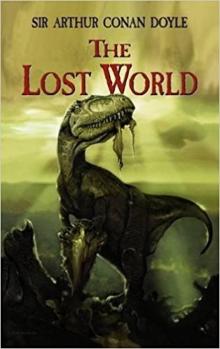 The Lost World
The Lost World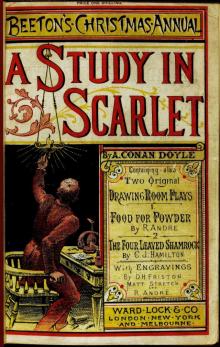 A Study in Scarlet
A Study in Scarlet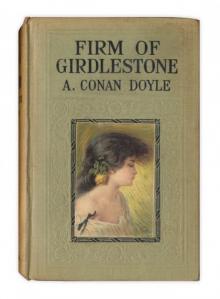 The Firm of Girdlestone
The Firm of Girdlestone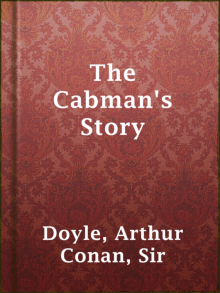 The Cabman's Story
The Cabman's Story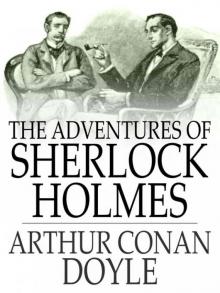 The Adventures of Sherlock Holmes
The Adventures of Sherlock Holmes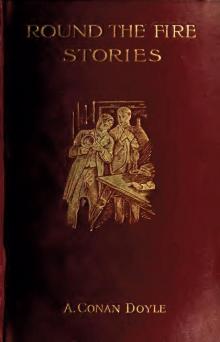 Round the Fire Stories
Round the Fire Stories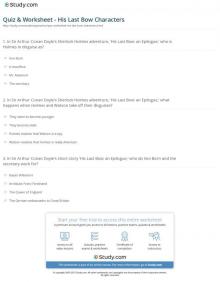 His Last Bow: An Epilogue of Sherlock Holmes
His Last Bow: An Epilogue of Sherlock Holmes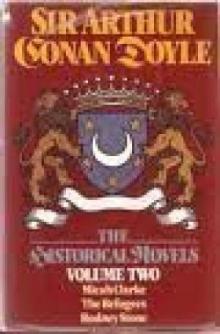 Micah Clarke
Micah Clarke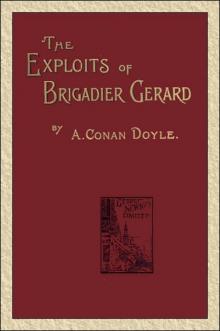 The Exploits of Brigadier Gerard
The Exploits of Brigadier Gerard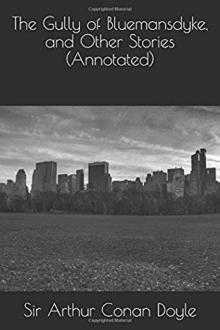 The Gully of Bluemansdyke, and Other stories
The Gully of Bluemansdyke, and Other stories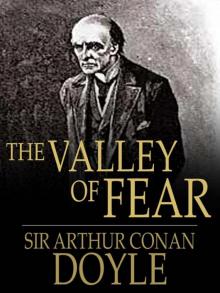 The Valley of Fear
The Valley of Fear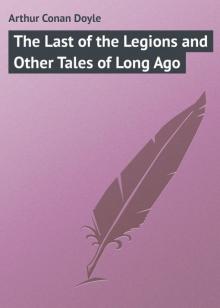 The Last of the Legions and Other Tales of Long Ago
The Last of the Legions and Other Tales of Long Ago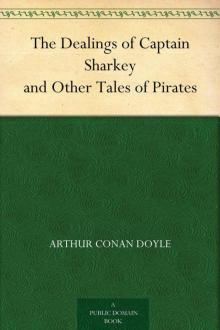 The Dealings of Captain Sharkey, and Other Tales of Pirates
The Dealings of Captain Sharkey, and Other Tales of Pirates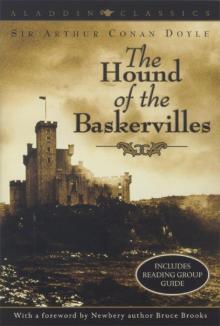 The Hound of the Baskervilles
The Hound of the Baskervilles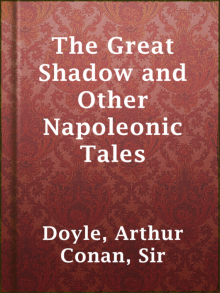 The Great Shadow and Other Napoleonic Tales
The Great Shadow and Other Napoleonic Tales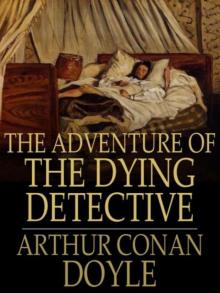 The Adventure of the Dying Detective
The Adventure of the Dying Detective The Man from Archangel, and Other Tales of Adventure
The Man from Archangel, and Other Tales of Adventure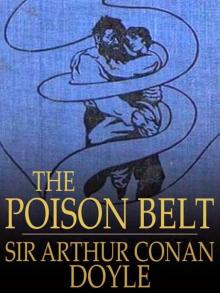 The Poison Belt
The Poison Belt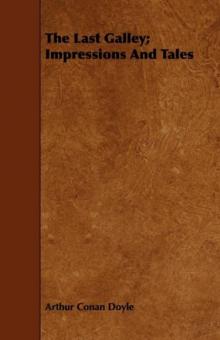 The Last Galley; Impressions and Tales
The Last Galley; Impressions and Tales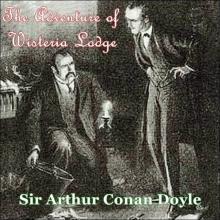 The Adventure of Wisteria Lodge
The Adventure of Wisteria Lodge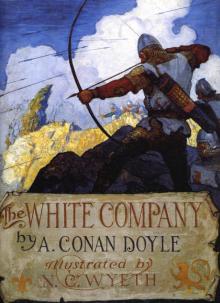 The White Company
The White Company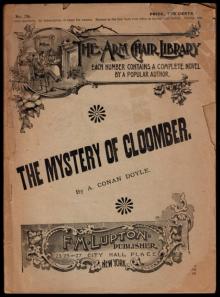 The Mystery of Cloomber
The Mystery of Cloomber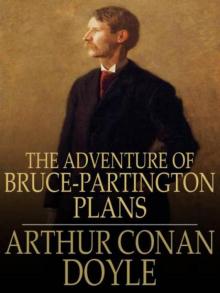 The Adventure of the Bruce-Partington Plans
The Adventure of the Bruce-Partington Plans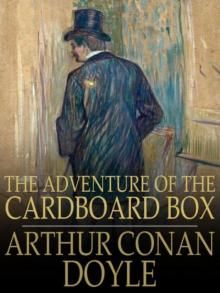 The Adventure of the Cardboard Box
The Adventure of the Cardboard Box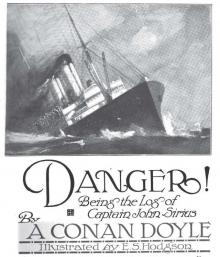 Danger! and Other Stories
Danger! and Other Stories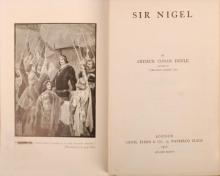 Sir Nigel
Sir Nigel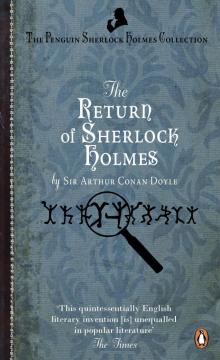 The Return of Sherlock Holmes
The Return of Sherlock Holmes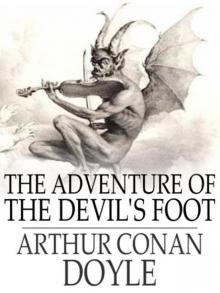 The Adventure of the Devil's Foot
The Adventure of the Devil's Foot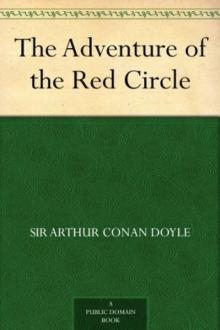 The Adventure of the Red Circle
The Adventure of the Red Circle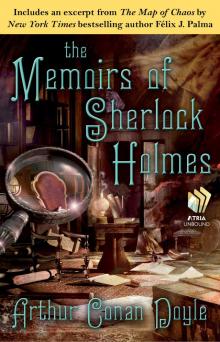 The Memoirs of Sherlock Holmes
The Memoirs of Sherlock Holmes The Adventure of the Yellow Face
The Adventure of the Yellow Face The Adventure of the Norwood Builder
The Adventure of the Norwood Builder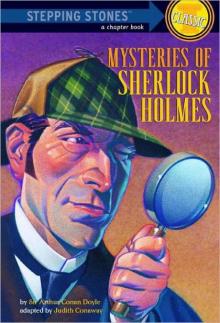 Mysteries of Sherlock Holmes
Mysteries of Sherlock Holmes The Adventure of the Missing Three-Quarter
The Adventure of the Missing Three-Quarter The Adventure of the Final Problem
The Adventure of the Final Problem A Scandal in Bohemia
A Scandal in Bohemia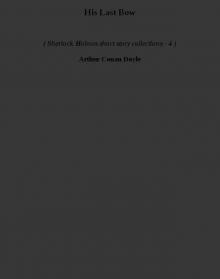 His Last Bow shssc-4
His Last Bow shssc-4 Beyond The City
Beyond The City The Adventure of the Gloria Scott
The Adventure of the Gloria Scott The Parasite
The Parasite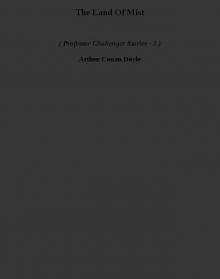 The Land Of Mist pcs-3
The Land Of Mist pcs-3 The Adventure of the Musgrave Ritual
The Adventure of the Musgrave Ritual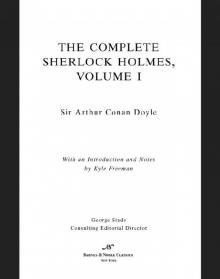 The Complete Sherlock Holmes, Volume I (Barnes & Noble Classics Series)
The Complete Sherlock Holmes, Volume I (Barnes & Noble Classics Series) The Adventure of the Stockbroker's Clerk
The Adventure of the Stockbroker's Clerk The Adventure of the Copper Beeches
The Adventure of the Copper Beeches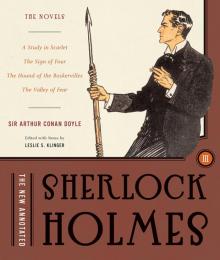 The New Annotated Sherlock Holmes
The New Annotated Sherlock Holmes When The World Screamed pcs-5
When The World Screamed pcs-5 The Adventure of the Six Napoleons
The Adventure of the Six Napoleons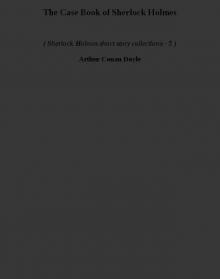 The Case Book of Sherlock Holmes shssc-5
The Case Book of Sherlock Holmes shssc-5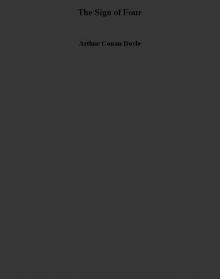 The Sign of Four
The Sign of Four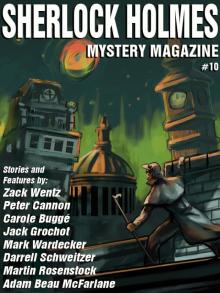 Sherlock Holmes Mystery Magazine #10
Sherlock Holmes Mystery Magazine #10 The Adventures of Brigadier Gerard
The Adventures of Brigadier Gerard The Adventure of the Second Stain
The Adventure of the Second Stain The Adventure of the Engineer's Thumb
The Adventure of the Engineer's Thumb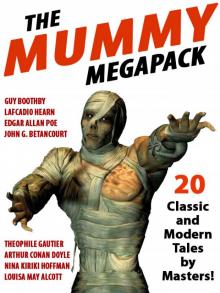 The Mummy Megapack
The Mummy Megapack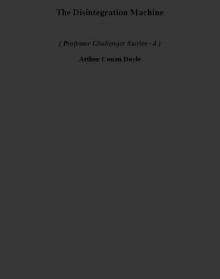 The Disintegration Machine pcs-4
The Disintegration Machine pcs-4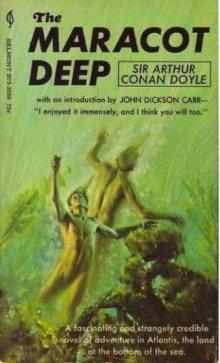 The Maracot Deep
The Maracot Deep The Five Orange Pips
The Five Orange Pips The Adventure of the Crooked Man
The Adventure of the Crooked Man The Adventure of the Blue Carbuncle
The Adventure of the Blue Carbuncle The Adventure of Silver Blaze
The Adventure of Silver Blaze The Adventure of the Solitary Cyclist
The Adventure of the Solitary Cyclist The Adventure of the Naval Treaty
The Adventure of the Naval Treaty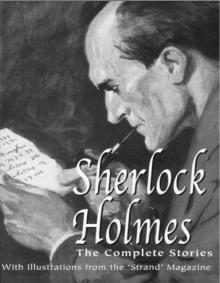 Sherlock Holmes. The Complete Stories
Sherlock Holmes. The Complete Stories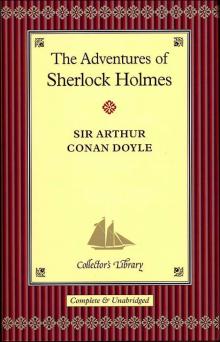 The Adventures of Sherlock Holmes (sherlock holmes)
The Adventures of Sherlock Holmes (sherlock holmes) The Adventure of the Empty House
The Adventure of the Empty House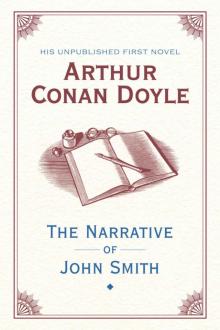 The Narrative of John Smith
The Narrative of John Smith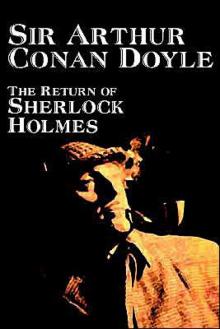 The Return of Sherlock Holmes (sherlock holmes)
The Return of Sherlock Holmes (sherlock holmes) The New Revelation
The New Revelation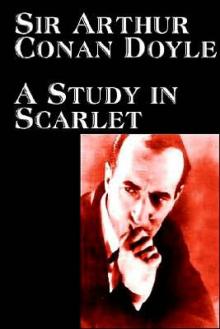 A Study in Scarlet (sherlock holmes)
A Study in Scarlet (sherlock holmes) The Vital Message
The Vital Message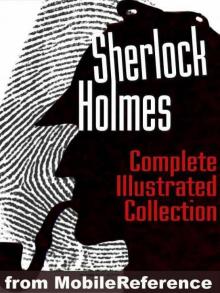 Sherlock Holmes Complete Collection
Sherlock Holmes Complete Collection Round the Red Lamp
Round the Red Lamp The Boscombe Valley Mystery
The Boscombe Valley Mystery The Adventure of the Beryl Coronet
The Adventure of the Beryl Coronet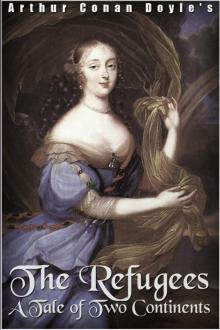 The Refugees
The Refugees The Adventure of the Three Students.
The Adventure of the Three Students.